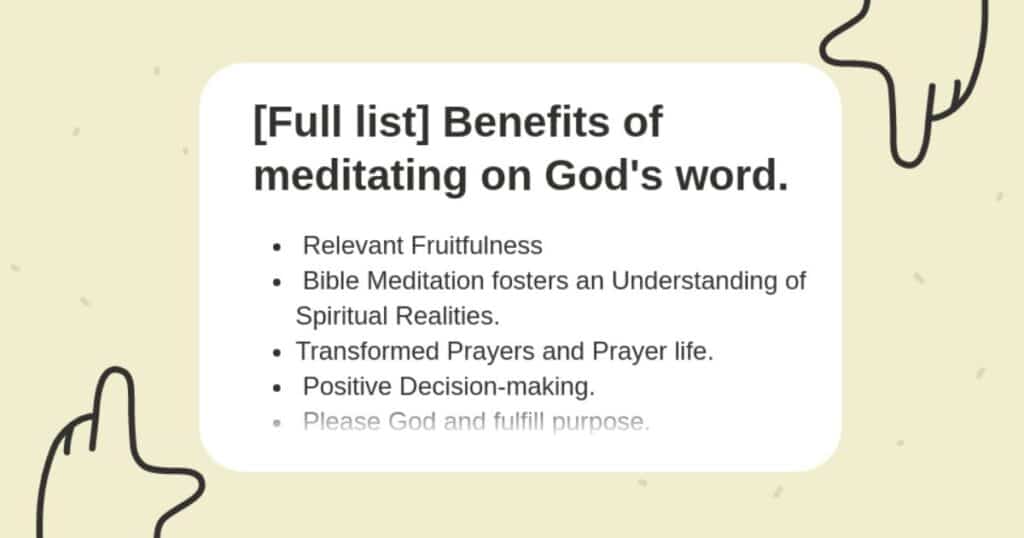Meditation is a powerful practice that has been embraced by various religions and cultures throughout history. It is a means of quieting the mind, finding inner peace, and connecting with one’s spiritual self. For those who follow the teachings of the Bible, meditating on the Word of God is a crucial aspect of their spiritual journey. The Bible encourages believers to meditate on the Word day and night, as it is a source of guidance, wisdom, and nourishment for the soul.
In this article, we will explore the importance of meditating on the Word day and night and provide practical tips on how to incorporate this practice into your daily life.
The Importance Of Meditating On The Word
The Bible is not just a collection of stories and teachings; it is the living Word of God, a roadmap for life, and a source of eternal truth. Meditating on the Word day and night is a way to imbibe these truths and allow them to permeate every aspect of our lives. Here are some reasons why it is crucial to meditate on the Word:
- Spiritual Growth: Meditating on the Word helps us to grow in our faith and deepen our relationship with God. As we ponder the Scriptures, we gain a better understanding of God’s character, His will, and His plan for our lives.
- Wisdom and Discernment: The Word of God is a wellspring of wisdom and discernment. By meditating on it, we can gain the insight and understanding needed to navigate the complexities of life and make wise decisions.
- Renewed Mind: The Bible instructs us to be transformed by the renewing of our minds (Romans 12:2). Meditating on the Word helps to reshape our thought patterns and align our minds with the truth, enabling us to overcome negative thought patterns and embrace a godly mindset.
- Strength and Encouragement: Life is filled with challenges and struggles, but the Word of God offers strength and encouragement to overcome them. Meditating on the promises and teachings of the Bible can provide the hope and resilience we need to persevere through difficult times.
- Obedience and Fruitfulness: As we meditate on the Word, we become more attuned to God’s will and are better equipped to live a life of obedience and fruitfulness. The Word guides us in our daily decisions and actions, enabling us to bear fruit that honors God.
Practical Tips For Meditating On The Word Day And Night

Meditating on the Word is not a complicated process, but it does require intentionality and discipline. Here are some practical tips to help you incorporate this practice into your daily life:
- Set Aside Dedicated Time: Determine a specific time each day when you can devote yourself to meditating on the Word without distractions. It could be first thing in the morning, during your lunch break, or before bedtime – whatever works best for your schedule.
- Choose a Suitable Environment: Find a quiet, comfortable place where you can focus without interruptions. This could be a cozy corner in your home, a peaceful outdoor spot, or even a quiet room at your workplace.
- Prepare Your Heart: Before diving into the Word, take a few moments to quiet your mind and prepare your heart. You can do this through prayer, deep breathing exercises, or listening to calming music.
- Read and Reflect: Select a passage or chapter from the Bible and read it slowly and thoughtfully. As you read, pay attention to the words, phrases, or verses that stand out to you. Reflect on their meaning and how they might apply to your life.
- Write or Journal: Keeping a journal can be a powerful tool in your meditation practice. As you ponder the Word, write down your thoughts, insights, and questions. This helps to solidify your understanding and provides a record of your spiritual journey.
- Memorize and Meditate: Choose a verse or a short passage that resonates with you and commit it to memory. Throughout the day, recite and meditate on these words, allowing them to sink deeper into your heart and mind.
- Apply and Obey: Meditating on the Word is not just an intellectual exercise; it should lead to practical application and obedience. As you gain insights from the Word, seek ways to put them into practice in your daily life.
- Seek Accountability: Share your meditation journey with fellow believers or join a small group study. Discussing the Word with others can provide additional insights and encourage you to stay committed to your practice.
- Persist and Be Consistent: Meditating on the Word is a lifelong pursuit. There may be times when it feels challenging or when distractions arise. However, persist in your efforts and remain consistent, trusting that the Word will bear fruit in your life.
- Pray for Understanding: Finally, remember to pray for the Holy Spirit’s guidance and illumination as you meditate on the Word. The Scriptures are living and active, and it is the Spirit who breathes life into them and reveals their depths to us.
The Power of Meditation in Ancient Traditions
Meditation has been practiced for centuries across various cultures and religions. In ancient traditions, it was seen as a means of connecting with the divine, cultivating inner peace, and achieving spiritual enlightenment. The practice of meditating on sacred texts or scriptures was a common thread among many of these traditions.
Hinduism And Buddhism
In Hinduism, the practice of meditation is deeply rooted in the Vedas, the ancient Hindu scriptures. The Bhagavad Gita, one of the most revered Hindu texts, emphasizes the importance of meditation as a path to self-realization and union with the divine. Similarly, in Buddhism, meditation is a central practice, with the goal of achieving enlightenment and freedom from suffering.
Judeo-Christian Traditions
In the Judeo-Christian traditions, the practice of meditating on the Word of God has been embraced since ancient times. The Book of Psalms in the Bible is a rich source of meditative verses, and the practice of meditating on the Torah (the first five books of the Bible) is deeply ingrained in Jewish tradition.
Overcoming Obstacles In Meditation
While meditating on the Word can be a profoundly rewarding experience, it is not without its challenges. Many people struggle with quieting their minds, overcoming distractions, and remaining consistent in their practice.
Dealing With Distractions
One of the biggest obstacles to effective meditation is the constant stream of thoughts and distractions that can flood our minds. To combat this, it’s important to create a peaceful environment free from external distractions, such as noise or clutter. Additionally, practicing mindfulness techniques, such as focusing on your breath or repeating a mantra, can help quiet the mind and bring your attention back to the present moment.
Overcoming Restlessness And Boredom
For some, the act of sitting still and meditating can be challenging, leading to feelings of restlessness or boredom. To overcome this, you may want to experiment with different meditation postures or incorporate movement, such as walking meditation or gentle stretching. Remember that meditation is not about achieving a specific state of mind but about being present and attentive to the Word.
Staying Consistent
Consistency is key when it comes to meditating on the Word. Like any habit, it takes time and effort to establish a regular practice. Start with a manageable commitment, such as 10-15 minutes per day, and gradually increase the duration as you become more comfortable. Setting reminders, scheduling your meditation time, or joining a group can help you stay accountable and maintain consistency.
The Benefits of Meditating on the Word

While the primary purpose of meditating on the Word is to deepen your spiritual connection and understanding, the practice also offers numerous ancillary benefits for your overall well-being.
Improved Mental Health
Numerous studies have shown that regular meditation can reduce stress, anxiety, and depression. By quieting the mind and focusing on the Word, you can cultivate a sense of calm and inner peace, which can have a profound impact on your mental health.
Enhanced Cognitive Function
Meditation has been linked to improved cognitive function, including better focus, concentration, and memory. As you train your mind to stay present and attentive during meditation, these benefits can extend to other areas of your life, enhancing your productivity and decision-making abilities.
Emotional Regulation
Meditating on the Word can help you develop greater emotional awareness and regulation. By reflecting on the teachings and principles found in the Scriptures, you can gain a deeper understanding of your emotions and learn to respond to them in a more constructive and healthy manner.
Physical Health Benefits
While meditation is primarily a spiritual and mental practice, it can also have positive impacts on physical health. Regular meditation has been shown to reduce blood pressure, improve sleep quality, and boost the immune system, among other benefits.
Embracing Meditation as a Lifestyle
Ultimately, meditating on the Word is not just a practice to be performed for a few minutes each day; it is a way of life. As you deepen your practice and allow the Word to permeate your thoughts and actions, you will find that it becomes a natural part of your daily routine, infusing every aspect of your life with spiritual wisdom and guidance.
Whether you are a seasoned practitioner or just beginning your journey, the rewards of meditating on the Word are immeasurable. By committing to this practice, you open yourself up to a world of spiritual growth, inner peace, and a deeper connection with the divine.
Meditating On The Word In Community
While meditating on the Word is often considered a personal and introspective practice, there is great value in engaging in it within a community of believers. Sharing in this spiritual discipline with others can provide a sense of fellowship, accountability, and deeper understanding.
The Power of Group Study
Gathering with others to study and meditate on the Word can be a profound experience. As individuals share their insights, questions, and perspectives, a richer understanding of the Scriptures can emerge. Group study also fosters a sense of unity and encouragement, as believers journey together on their spiritual path.
Accountability and Support
Joining a meditation or Bible study group can provide invaluable accountability and support. When we share our goals and struggles with others, we are more likely to stay committed to our practice. Additionally, the encouragement and wisdom of fellow believers can help us navigate challenges and overcome obstacles in our meditation journey.
Intergenerational Learning
One of the unique benefits of meditating on the Word in community is the opportunity for intergenerational learning. By engaging with believers of different ages and life experiences, we can gain fresh perspectives and insights into the Scriptures. Younger generations can learn from the wisdom of elders, while elders can be inspired by the energy and enthusiasm of youth.
Cultivating a Lifestyle of Meditation
Meditating on the Word is not just a temporary practice but a lifelong pursuit. As we incorporate it into our daily routines, it becomes a way of life, shaping our thoughts, actions, and decisions.
Establishing a Consistent Routine
To truly cultivate a lifestyle of meditation, it is essential to establish a consistent routine. This may involve setting aside a specific time each day for meditation, creating a dedicated space in your home, or even incorporating meditation into your daily commute or leisure activities.
Integrating Meditation into Daily Life
Beyond dedicated meditation sessions, it is also beneficial to find ways to integrate the practice into your daily life. This could involve reciting or reflecting on Scripture throughout the day, practicing mindfulness while engaging in routine tasks, or simply taking moments to pause and center yourself on the Word.
Letting the Word Permeate Your Thoughts and Actions
As you consistently meditate on the Word, its teachings and principles will naturally begin to permeate your thoughts and actions. You may find yourself responding to situations with greater wisdom, patience, and compassion, as the Word guides your decision-making and interactions with others.
Sharing the Practice with Others
One of the most powerful ways to cultivate a lifestyle of meditation is to share the practice with others. Whether it is with your family, friends, or community, encouraging and guiding others to engage with the Word can deepen your own understanding and commitment.
By embracing meditation on the Word as a way of life, you open yourself up to a profound and transformative journey. As the Scriptures become woven into the fabric of your being, you will experience a deeper sense of purpose, peace, and connection with the divine.
The Fruits of Perseverance
Meditating on the Word is not always an easy path, and there may be times when you face challenges, distractions, or periods of dryness. However, perseverance in this practice yields immeasurable spiritual fruits.
Deepening Your Relationship with God
As you faithfully meditate on the Word, your relationship with God will deepen and grow richer. The Scriptures will come alive, and you will gain a more intimate understanding of God’s character, His ways, and His desires for your life.
Cultivating Spiritual Discernment
Through consistent meditation, you will develop a greater ability to discern the voice of God and the leading of the Holy Spirit. As you become attuned to the nuances and depths of the Word, you will be better equipped to navigate life’s complexities and make decisions aligned with God’s will.
Developing Christlike Character
One of the profound fruits of meditating on the Word is the gradual transformation of your character to become more like Christ. As you immerse yourself in the teachings and examples set forth in the Scriptures, you will find yourself embodying qualities such as love, patience, humility, and compassion.
Bearing Spiritual Fruit
The Bible teaches that those who meditate on the Word will be like trees planted by streams of water, bearing fruit in its season (Psalm 1:2-3). As you remain rooted in the Word, you will bear spiritual fruit in your life, impacting those around you and furthering the kingdom of God.
Finding Peace and Joy
In a world that often feels chaotic and overwhelming, meditating on the Word can provide a profound sense of peace and joy. As you dwell on the promises and truths found in the Scriptures, you will find comfort, hope, and a deep-rooted joy that transcends circumstances.
Persevering Through Challenges
Inevitably, life will present challenges and difficulties, but those who meditate on the Word will find the strength and resilience to persevere. The Scriptures will be a source of encouragement and inspiration, reminding you of God’s faithfulness and the ultimate victory that awaits those who remain steadfast.
The fruits of perseverance in meditating on the Word are abundant and life-changing. By remaining committed to this practice, you will experience a profound transformation that will not only impact your own life but also ripple outward, touching the lives of those around you.
Meditating on the Word and Prayer

Meditation and prayer are often seen as complementary spiritual practices, each enriching and deepening the other. When we meditate on the Word, we create space for a more meaningful and profound prayer life.
Prayer as a Dialogue with God
At its core, prayer is a dialogue with God – a way to communicate our thoughts, desires, and needs, while also listening for His voice and guidance. Meditating on the Word provides a rich foundation for this dialogue, as it helps us better understand the character and will of God.
Praying Scripture
One powerful way to integrate meditation and prayer is through the practice of praying Scripture. This involves reading a passage from the Bible and then turning it into a prayer, either by paraphrasing the words or using them as a springboard for your own heartfelt petitions and praises.
Lectio Divina
Lectio Divina, meaning “divine reading,” is an ancient Christian practice that combines reading, meditation, prayer, and contemplation. In this practice, you slowly read and reflect on a passage from Scripture, allowing the words to penetrate your heart and mind. This meditation then naturally flows into prayer, as you engage in a dialogue with God about the insights and promptings you have received.
Intercessory Prayer
Meditating on the Word can also deepen our practice of intercessory prayer – praying for the needs of others. As we meditate on the teachings of love, compassion, and service found in the Scriptures, our hearts are stirred to pray for those who are suffering, oppressed, or in need of God’s intervention.
Cultivating a Prayerful Mindset
Ultimately, meditating on the Word helps to cultivate a prayerful mindset – a state of ongoing communion with God. As we allow the Word to permeate our thoughts and actions, we become more attuned to God’s presence and more inclined to turn to Him in prayer throughout our day.
Also Read: A Beginner’s Guide to Meditation Techniques
The Transformative Power of Meditating on the Word
Meditating on the Word is not merely an intellectual exercise or a means of acquiring knowledge; it is a transformative practice that has the power to shape our hearts, minds, and lives.
Renewing the Mind
The apostle Paul exhorts believers to “be transformed by the renewing of your mind” (Romans 12:2). Meditating on the Word is a powerful way to achieve this renewal, as it allows the truth of Scripture to reshape our thoughts, beliefs, and perspectives.
Overcoming Negative Thought Patterns
Many of us struggle with negative thought patterns, such as worry, fear, or self-doubt. By meditating on the Word, we can replace these destructive thoughts with the truth of God’s promises and encouragements.
Developing Godly Character
The Word of God is not only a source of knowledge but also a blueprint for godly character. As we meditate on the teachings and examples found in Scripture, we are challenged and inspired to embody qualities such as love, patience, humility, and integrity.
Aligning Our Will with God’s Will
One of the most profound transformations that can occur through meditating on the Word is the alignment of our will with God’s will. As we immerse ourselves in the Scriptures, we gain a deeper understanding of God’s purposes and desires, and our own desires begin to shift and conform to His.
Cultivating Spiritual Fruit
The Bible teaches that those who abide in the Word will bear spiritual fruit (John 15:5). As we meditate on the Word and allow it to take root in our hearts, we will see the fruit of the Spirit – love, joy, peace, patience, kindness, goodness, faithfulness, gentleness, and self-control – manifested in our lives.
Becoming a Living Testament
Ultimately, the goal of meditating on the Word is not merely personal transformation but becoming a living testament to the power and truth of the Scriptures. As we embody the teachings of the Word, we become living examples of God’s love and grace, influencing and inspiring those around us.
The transformative power of meditating on the Word is immense, and its impact can ripple outward, affecting our families, communities, and the world around us. It is a journey of continual growth, renewal, and alignment with the heart and purposes of God.
Meditating on the Word: A Lifelong Journey

Meditating on the Word is not a destination but a lifelong journey filled with growth, discovery, and deeper intimacy with God. As we traverse this path, it is essential to embrace a posture of humility, openness, and perseverance.
A Posture of Humility
Approaching the Word of God with humility is crucial. We must recognize that the Scriptures are not merely a collection of human wisdom but the very words of the living God. As we meditate on the Word, we must lay aside our preconceptions and biases, allowing the truth to challenge and transform us.
Embracing Mystery and Wonder
The depths of the Word are unfathomable, and even after a lifetime of study and meditation, there will always be mysteries and wonders yet to be unveiled. Embracing this sense of awe and wonder can fuel our desire to continue exploring the riches of the Scriptures.
Persevering Through Seasons of Dryness
Like any spiritual practice, there may be seasons when meditating on the Word feels dry or challenging. During these times, it is essential to persevere and trust that God will reignite the flame in His perfect timing.
Seeking Wisdom and Guidance
As we journey through the Word, it is important to seek wisdom and guidance from trusted sources – pastors, teachers, and fellow believers who have walked this path before us. Their insights and experiences can shed light on our own struggles and questions.
Celebrating Growth and Transformation
While meditating on the Word is a lifelong journey, it is essential to celebrate the milestones of growth and transformation along the way. Recognizing how the Word has shaped and molded us can provide encouragement and motivation to continue pressing forward.
Conclusion
Meditating on the Word is an ongoing, lifelong journey that demands humility as you approach the unfathomable depths of God’s Word. Persevere through inevitable dry seasons, seeking guidance from trusted sources. Celebrate milestones of growth as the Scriptures transform your character, while embracing a sense of awe for the mysteries that remain.
As you mature in this practice, take the opportunity to inspire others by sharing your passion for the Word. This journey intimately aligns your will with God’s and leads you to become a living embodiment of Scripture’s truth and power. Though challenging at times, diligently meditating day and night produces profound spiritual fruit. Approach this journey wholeheartedly, allowing the Word to permeate every aspect of your life as you grow in intimacy with the living God.
FAQ’s
What does it mean to meditate on his word day and night?
Meditating on God’s word day and night means consistently reflecting on and internalizing Scripture, allowing it to shape one’s thoughts, attitudes, and actions throughout the day.
How to meditate on God’s word daily?
Christians can meditate on God’s word daily by setting aside intentional time for prayer, reading Scripture, and reflecting on its meaning and application to their lives.
When David meditated on the word day and night?
David meditated on the word day and night as described in Psalm 1:2, where he found delight in God’s law and meditated on it continually.
How do Christians meditate on the word?
Christians can meditate on the word by engaging in practices such as lectio divina, memorization, journaling, and contemplative prayer, allowing Scripture to dwell richly in their hearts.
What does the Bible say we should meditate on?
The Bible instructs believers to meditate on things that are true, noble, right, pure, lovely, admirable, excellent, and praiseworthy (Philippians 4:8), focusing on God’s truth and character.

George, an esteemed author with 8 years of experience in meditation, imparts transformative knowledge on meditatefulhub.com. His writings resonate globally, guiding individuals on a profound journey of self-discovery and inner peace.






![How to Cancel Your Brazzers Subscription Complete Guide [2024]](https://meditatefulhub.com/wp-content/uploads/2024/11/How-to-Cancel-Your-Brazzers-Subscription-Complete-Guide-2024-300x157.jpg)




